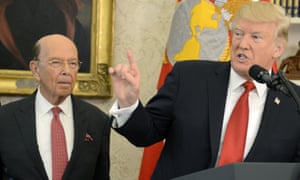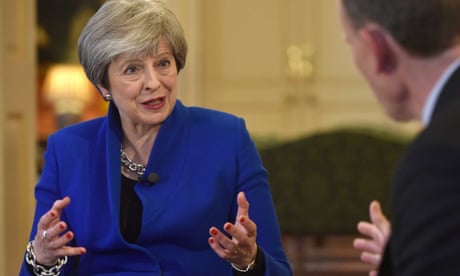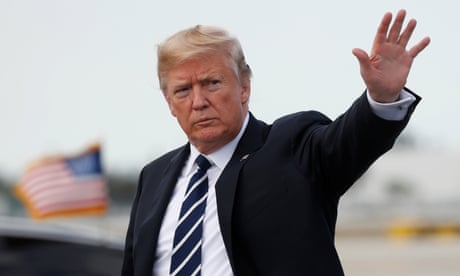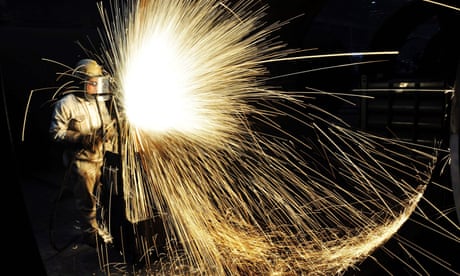Trump aides defend tariffs move as Europe and China decry 'trade war'

Commerce secretary Wilbur Ross listens to Donald Trump speak. Photograph: UPI / Barcroft Images
White House officials fanned out on Sunday to support Donald Trump’s planned imposition of tariffs on aluminium and steel imports, describing it as a national security issue.
Amid international consternation, and with British prime minister Theresa May expressing “deep concern”, critics said the move was a needless provocation of allies and enemies alike.

May tells Trump of 'deep concern' over US trade tariff plans
Read more
One Democratic senator said targeting China could damage attempts to reduce tensions with nuclear-armed North Korea. A senior Chinese official said the tariffs could “damage bilateral relations and bring about consequences that neither country wants to see”.
Peter Navarro, director of the White House National Trade Council, confirmed that China was the focus of Trump’s surprise decision, announced at the White House this week.
“China is at the root of the problem,” Navarro told CNN’s Face the Nation. “China has tremendous overcapacity in both aluminium and steel. They flood the world market and this whittles down to our shores.”
Trump’s announcement triggered deep divisions in his own economic team. It was also condemned by World Trade Organisation (WTO) and US allies including Canada and South Korea, which between them account for a quarter of US steel imports. China accounts for just 2%.
Navarro insisted Trump’s decision, which could be brought into effect as soon as next week, was “quintessential and great”.
It was “unlikely” the administration would agree any national exemptions, he said, adding: “This is an action to protect our national, economic security. We can’t have a country that can defend itself and prosper without an aluminium and steel industry.”

Trump escalates trade war rhetoric with threat to tax Europe-made cars
Read more
There would however be a business “exemption procedure for particular cases … so that business can move forward”, Navarro said.
Navarro denied that Trump was considering withdrawing from the WTO although he said the body was “a lot of the problem” and needed to change with the times. The White House, he said, was focused on trading conditions that had been unfairly skewed for decades. Pointing the finger directly at China, he said Trump had sent a strong signal.
“We’re not going to take it anymore,” he said. “We have the lowest tariffs in the world and what we get from that is not fair and reciprocal trade, we get half a trillion dollars a year trade deficit that puts our wealth and jobs offshore.”
“A lot of the problem has been the World Trade Organisation. We don’t get good results there, and a lot of them don’t like us. We’re free-traders, we’re fair and reciprocal traders, and the World Trade Organisation needs to change with the times.”
Trump’s commerce secretary, Wilbur Ross, told NBC’s Meet the Press he had “no reason to believe” the president would change his mind on tariffs, as he has on a number of policies.
He added: “I don’t know why anybody should be so shocked.” But he tempered his comments, saying: “Everybody talks about tariffs as the first thing. Tariffs are the last thing. Tariffs are a part of the negotiation. The real trick is going to be increase American exports.”
On ABC’s This Week, Ross dismissed the effect of threatened reciprocal European Union tariffs on such American products as Harley Davidson motorcycles, Levi’s jeans and Kentucky bourbon whiskey “as nothing more than a rounding error”.
Among Democrats, the Connecticut senator Chris Murphy warned against starting a trade war with China when the the US needs support to resolve North Korea’s nuclear ambition. A trade battle with Europe, he said, would be “a gift to Russia”.
“The president needs to understand that targeted sanctions are necessary but you have to do it at the right moment and realize that none of it takes place in a vacuum,” Murphy said.
Trump’s proposals have received measured support from the Pentagon, which has said it supports the move but would prefer a targeted rather a unilateral system. Defense Secretary James Mattis has voiced concern over the impact on allies.
The White House said on Friday that Trump had held calls with German chancellor Angela Merkel and French president Emmanuel Macron. British prime minister Theresa May said on Sunday she had spoken to Trump. Cabinet Office minister David Lidington told the BBC: “the United States is not taking an advisable course” and added: “Trade wars don’t do anybody any good.”

Trump trade tariffs: Europe threatens US bikes, bourbon and bluejeans
Read more
The decision has also inflamed rifts within the White House. Chief economic adviser Gary Cohn reportedly called the tariffs “obviously stupid”, and has been said to be close to resigning.
Senior Republicans in Congress, committed to party orthodoxy on free trade, have decried the move. On Sunday South Carolina senator Lindsey Graham told CBS’s Face the Nation Trump was making “making a huge mistake” and should “go after China, not the rest of the world”.
Overnight, an official in Beijing said China would defend its interests. Chinese vice-foreign minister Zhang Yesui said negotiations and mutual opening of markets were the best ways to resolve trade conflicts.
“China does not want to fight a trade war with the United States but we absolutely will not sit by and watch as China’s interests are damaged,” said Zhang, a spokesman for Parliament and formerly an ambassador to the US.
“If policies are made on the basis of mistaken judgments or assumptions, it will damage bilateral relations and bring about consequences that neither country wants to see.”
White House officials fanned out on Sunday to support Donald Trump’s planned imposition of tariffs on aluminium and steel imports, describing it as a national security issue.
Amid international consternation, and with British prime minister Theresa May expressing “deep concern”, critics said the move was a needless provocation of allies and enemies alike.

May tells Trump of 'deep concern' over US trade tariff plans
Read more
One Democratic senator said targeting China could damage attempts to reduce tensions with nuclear-armed North Korea. A senior Chinese official said the tariffs could “damage bilateral relations and bring about consequences that neither country wants to see”.
Peter Navarro, director of the White House National Trade Council, confirmed that China was the focus of Trump’s surprise decision, announced at the White House this week.
“China is at the root of the problem,” Navarro told CNN’s Face the Nation. “China has tremendous overcapacity in both aluminium and steel. They flood the world market and this whittles down to our shores.”
Trump’s announcement triggered deep divisions in his own economic team. It was also condemned by World Trade Organisation (WTO) and US allies including Canada and South Korea, which between them account for a quarter of US steel imports. China accounts for just 2%.
Navarro insisted Trump’s decision, which could be brought into effect as soon as next week, was “quintessential and great”.
It was “unlikely” the administration would agree any national exemptions, he said, adding: “This is an action to protect our national, economic security. We can’t have a country that can defend itself and prosper without an aluminium and steel industry.”

Trump escalates trade war rhetoric with threat to tax Europe-made cars
Read more
There would however be a business “exemption procedure for particular cases … so that business can move forward”, Navarro said.
Navarro denied that Trump was considering withdrawing from the WTO although he said the body was “a lot of the problem” and needed to change with the times. The White House, he said, was focused on trading conditions that had been unfairly skewed for decades. Pointing the finger directly at China, he said Trump had sent a strong signal.
“We’re not going to take it anymore,” he said. “We have the lowest tariffs in the world and what we get from that is not fair and reciprocal trade, we get half a trillion dollars a year trade deficit that puts our wealth and jobs offshore.”
“A lot of the problem has been the World Trade Organisation. We don’t get good results there, and a lot of them don’t like us. We’re free-traders, we’re fair and reciprocal traders, and the World Trade Organisation needs to change with the times.”
Trump’s commerce secretary, Wilbur Ross, told NBC’s Meet the Press he had “no reason to believe” the president would change his mind on tariffs, as he has on a number of policies.
He added: “I don’t know why anybody should be so shocked.” But he tempered his comments, saying: “Everybody talks about tariffs as the first thing. Tariffs are the last thing. Tariffs are a part of the negotiation. The real trick is going to be increase American exports.”
On ABC’s This Week, Ross dismissed the effect of threatened reciprocal European Union tariffs on such American products as Harley Davidson motorcycles, Levi’s jeans and Kentucky bourbon whiskey “as nothing more than a rounding error”.
Among Democrats, the Connecticut senator Chris Murphy warned against starting a trade war with China when the the US needs support to resolve North Korea’s nuclear ambition. A trade battle with Europe, he said, would be “a gift to Russia”.
“The president needs to understand that targeted sanctions are necessary but you have to do it at the right moment and realize that none of it takes place in a vacuum,” Murphy said.
Trump’s proposals have received measured support from the Pentagon, which has said it supports the move but would prefer a targeted rather a unilateral system. Defense Secretary James Mattis has voiced concern over the impact on allies.
The White House said on Friday that Trump had held calls with German chancellor Angela Merkel and French president Emmanuel Macron. British prime minister Theresa May said on Sunday she had spoken to Trump. Cabinet Office minister David Lidington told the BBC: “the United States is not taking an advisable course” and added: “Trade wars don’t do anybody any good.”

Trump trade tariffs: Europe threatens US bikes, bourbon and bluejeans
Read more
The decision has also inflamed rifts within the White House. Chief economic adviser Gary Cohn reportedly called the tariffs “obviously stupid”, and has been said to be close to resigning.
Senior Republicans in Congress, committed to party orthodoxy on free trade, have decried the move. On Sunday South Carolina senator Lindsey Graham told CBS’s Face the Nation Trump was making “making a huge mistake” and should “go after China, not the rest of the world”.
Overnight, an official in Beijing said China would defend its interests. Chinese vice-foreign minister Zhang Yesui said negotiations and mutual opening of markets were the best ways to resolve trade conflicts.
“China does not want to fight a trade war with the United States but we absolutely will not sit by and watch as China’s interests are damaged,” said Zhang, a spokesman for Parliament and formerly an ambassador to the US.
“If policies are made on the basis of mistaken judgments or assumptions, it will damage bilateral relations and bring about consequences that neither country wants to see.”
No comments: